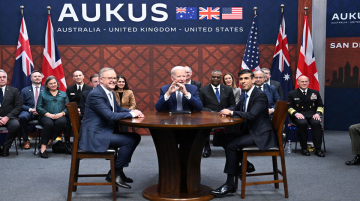
By Giulia Sciorati
China has begun renegotiating its once unwavering non-interference policy as the country has ascended to global power status. For years, China has attempted to reconcile its image of “responsible great power” with its narrative of “peaceful rise”, developing a “cautious” approach that avoids meddling in foreign conflicts and disputes that could force Beijing to assume a clear position in favor or against one of the conflicting parties.
Such a stance has been evident, for instance, in China’s voting behavior in the UN Security Council over the years with frequent abstentions in potentially controversial votes, particularly those involving the Global South.
However, the “interest” of Chinese diplomats in foreign conflict theatres has become a prominent feature in international media throughout 2023. Expectations for a more active Chinese role in global security management were accelerated by the release of several official documents, which, at the very least, revealed Beijing’s newfound “special attention” to ongoing crises worldwide.
Three cases denote a potential “interference with Chinese characteristics” in foreign conflicts and disputes in the future, including the publication of position papers on the Russo-Ukraine war in February 2023 and the Israel-Palestine war in November 2023 and of the joint statement on the successful “mediated” Iran-Saudi deal in March 2023.
China’s position papers treat the Russia-Ukraine and Israel-Palestine contexts similarly, encouraging a “political solution” (政治解决) brokered by the UN and centered around the will of the conflict-afflicted populations. Such an approach affords China the opportunity to exert influence on conflict resolutions while deflecting responsibility to supranational actors (the UN) and ascribing agency to the conflicting parties, thereby attempting to safeguard its non-interference trademark.
The Iran-Saudi case follows a similar pattern, placing Tehran and Riyad’s roles under the spotlight and downplaying those of “mediators” such as China, Iraq, or Oman. The “Joint Trilateral Statement,” for example, only gives active negotiating agency to Iran and Saudi Arabia. Tehran and Riyad, in fact, “express their appreciation and gratitude” to Baghdad and Muscat for hosting multiple dialogues in 2021 and 2022, as well as to China for “hosting and supporting talks.”
All three cases promote a political solution that places conflicting parties at the forefront and endorses hands-off Chinese “intervention”. This stance aligns with Beijing’s self-representation as a rising global power, distinguishing China’s practices from the U.S. and making the “Chinese approach” more appealing to the eyes of states that witnessed or experienced firsthand instability following direct U.S. military interventions.
Besides this, the documents emphasize humanitarian assistance and the protection of conflict-afflicted populations, thus reinforcing China’s image of responsible great power that prioritizes civilians and their wellbeing over great power politics. For instance, on 15 October 2023, Chinese Foreign Affairs Minister Wang Yi was quoted saying that “Israel’s actions have gone beyond the scope of self-defense, and Israel should […] stop its group punishment of the people in Gaza.”
Despite renegotiating its non-interference principle and becoming more proactive in global security management, China has not fully committed yet, holding on to a self-representation of a responsible global power that would like to have others do the heavy lifting.
Giulia Sciorati is an LSE Fellow in China and the Global South, in the Department of International Relations at LSE






